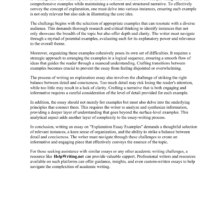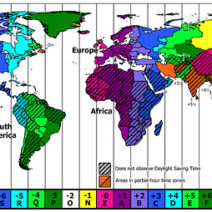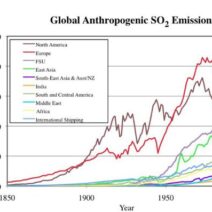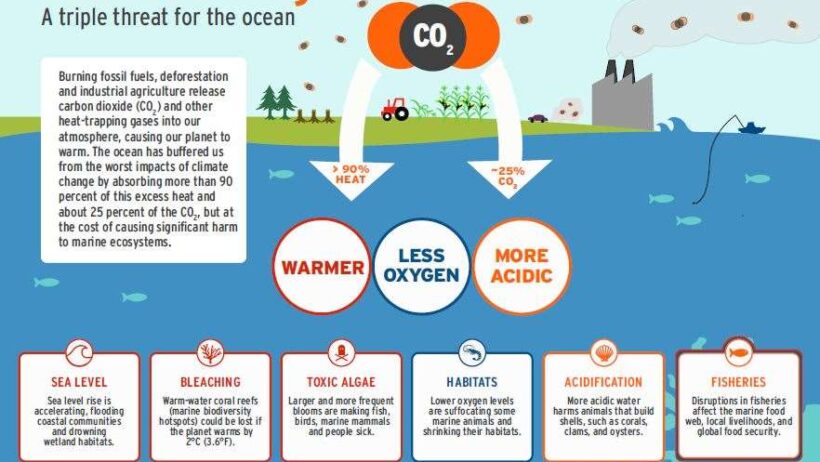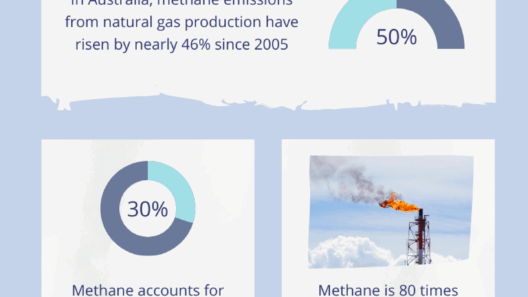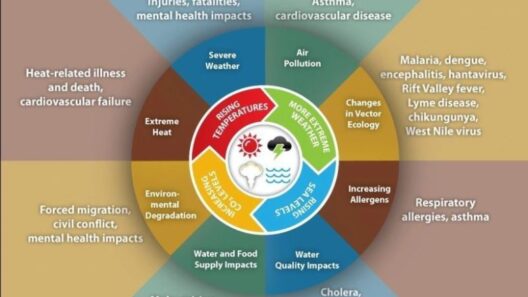Climate change is an intricate and multifaceted phenomenon that has reverberating effects on Earth’s oceans. The transformative challenges it poses can be distilled into three compelling categories: ocean acidification, thermal changes, and biodiversity loss. Each element is interrelated, collectively contributing to a narrative that underscores the urgency of our environmental plight.
The oceans, often characterized as the planet’s lungs, play a vital role in carbon sequestration, absorbing approximately 30% of the carbon dioxide (CO2) emitted by human activities. However, this ability comes at a significant cost. When CO2 dissolves in seawater, it results in a chemical reaction that lowers pH levels, leading to a phenomenon known as ocean acidification. The implications of this process are profound and alarming.
As the pH of oceanic waters decreases, the saturation state of calcium carbonate—a critical compound for marine organisms like corals and shellfish—also declines. Calcifying organisms rely on this compound to build their shells and skeletons, making them particularly susceptible to the corrosive effects of acidified water. For instance, coral reefs, which harbor an extraordinary diversity of marine life, face existential threats from acidification. These vital ecosystems, often regarded as the rainforests of the sea, are not only beautiful but also provide essential services, including coastal protection and habitat for myriad species.
The effects extend beyond coral reefs. Bivalves, such as oysters and clams, which are economically and ecologically important, are experiencing stunted growth and increased mortality rates due to acidification. These changes pose significant threats to fisheries, which many coastal economies depend on. The ripple effect of declining shellfish populations puts stress on local livelihoods and destabilizes food security for those who rely on these resources.
In conjunction with ocean acidification, global warming introduces additional thermodynamic stressors to marine environments. Earth’s average temperature has risen significantly, and the oceans are absorbing most of this excess heat. The consequences are twofold: shifts in species distributions and destabilization of marine ecosystems. The warming waters are pushing marine species toward the poles, searching for cooler habitats. This northward migration disrupts established ecological balances and poses challenges for fisheries adjusting to the influx of new species and the decline of others.
Furthermore, higher temperatures exacerbate phenomena such as coral bleaching. When stressed by heat, corals expel the symbiotic algae residing within their tissues. These algae, known as zooxanthellae, are vital to the coral’s survival, providing them with the energy they need through photosynthesis. The loss of these algae creates a stark white appearance—a process known as bleaching—and can lead to widespread coral death if stressful conditions persist. According to recent studies, some regions have witnessed a staggering decline in coral cover, signifying a shift toward less diverse and functionally weakened marine ecosystems.
But the tale does not end there. The multifarious response of marine assemblages to these pressures often includes shifts in reproductive patterns, altered food web dynamics, and increased vulnerability to diseases. For example, warmer waters can lead to the proliferation of harmful algal blooms, which not only threaten marine life but also pose risks to human health through contaminated seafood. The detrimental effects of such blooms can lead to toxic shellfish poisoning, ultimately affecting coastal communities reliant on seafood.
The impact of climate change on oceans extends beyond biological ramifications. The geopolitical landscape is also shifting. As fish stocks migrate and become less predictable, countries may enter into disputes over fishing rights and territorial waters, intensifying existing conflicts or leading to new tensions. A warming ocean presents a new dominion whereby nations must navigate complex ecological and social landscapes to protect their interests and sustain their populations.
Moreover, the implications of melting polar ice and glacial retreat are contributing to rising sea levels, posing an existential threat to coastal regions. Sea-level rise endangers low-lying islands and coastal cities, leading to increased flooding and loss of habitat. Nations are grappling with the implications of displacement and migration, further complicating the human element of climate change’s impact on oceans.
In confronting these daunting challenges, the need for concerted global action becomes paramount. Reducing carbon emissions, implementing effective marine protected areas, and fostering resilient ecosystems are vital strategies for mitigating the adverse impacts of climate change. Promoting sustainable fishing practices, investing in renewable energy sources, and advocating for policies that support ocean health are essential for holistic environmental stewardship.
While the narrative surrounding climate change often invokes despair, it also holds the potential for a paradigm shift. A renewed emphasis on marine conservation and an appreciation for the intricate interdependencies within ocean ecosystems can ignite curiosity and inspire collective action. A better understanding of these interactions might lead to innovative solutions that could redefine our relationship with the sea.
Ultimately, addressing the multifaceted challenges posed by climate change requires a paradigm shift in how society perceives and values the oceans. The call to action is clear: to cultivate a profound respect for our oceans and recognize their integral role in maintaining the planet’s health. As guardians of the blue planet, we must cultivate a sense of urgency and responsibility, engaging with the ocean not just as a resource, but as a vital ecosystem that deserves protection and preservation for future generations.
